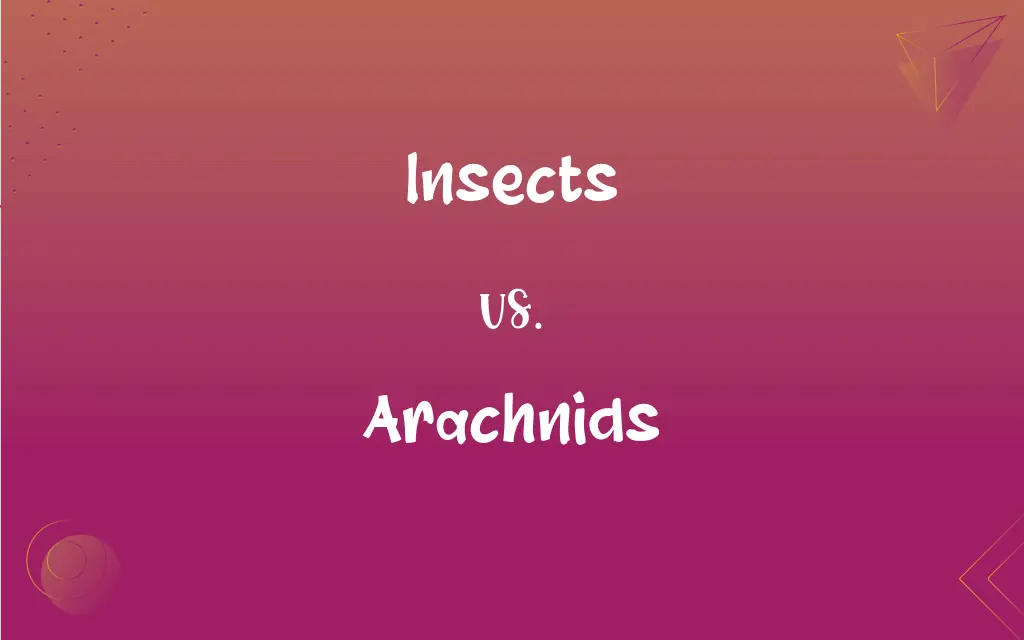Insects vs. Arachnids: What's the Difference?
Edited by Janet White || By Harlon Moss || Updated on October 20, 2023
Insects are six-legged creatures with three body segments, while arachnids are eight-legged creatures typically with two body segments.

Key Differences
Insects and arachnids are two distinct classes within the vast animal kingdom. Insects, which include creatures like butterflies, beetles, and ants, are identified by their three primary body parts: the head, thorax, and abdomen. Arachnids, on the other hand, such as spiders, scorpions, and mites, are mainly characterized by their two major body segments: the cephalothorax and the abdomen.
Insects typically possess six legs attached to their thoracic segment. This feature distinguishes them from the arachnids, which have eight legs attached to their cephalothorax. Moreover, the presence or absence of wings can also be a defining factor; while many insects have wings, arachnids do not.
While both insects and arachnids can be found in varied habitats around the globe, they serve different roles in their ecosystems. Insects often act as pollinators, aiding in the reproduction of various plants. Arachnids, however, mainly function as predators, helping control insect populations.
It's essential to understand that while all insects and arachnids are arthropods, not all arthropods fall into these two classes. Both have evolved over millions of years, adapting to their environments in unique ways. Despite their differences, insects and arachnids remain crucial for maintaining ecological balance.
Comparison Chart
Number of Legs
Six
Eight
ADVERTISEMENT
Body Segments
Three (head, thorax, abdomen)
Two (cephalothorax and abdomen)
Wings
Many have wings
Do not have wings
Antennae
Usually have one pair of antennae
Do not have antennae
Example Organisms
Butterflies, beetles, ants
Spiders, scorpions, mites
Insects and Arachnids Definitions
Insects
Small arthropods with three body segments and six legs.
The garden was teeming with colorful insects.
ADVERTISEMENT
Arachnids
Possess specialized appendages called chelicerae.
The chelicerae in certain arachnids are modified into fangs for injecting venom.
Insects
Play vital roles as pollinators in ecosystems.
The decline in bee populations could impact the number of pollinating insects.
Arachnids
Predatory creatures often feeding on insects.
The presence of arachnids in the garden helps control pest populations.
Insects
Many species have wings and can fly.
The insects hovered around the flowers, seeking nectar.
Arachnids
Eight-legged arthropods typically with two main body segments.
Arachnids like spiders can be found in most households.
Insects
Have compound eyes and often one pair of antennae.
The child was fascinated by the intricate details of the insects' eyes.
Arachnids
Lack wings and antennae.
Unlike many insects, arachnids don't have the ability to fly.
Insects
Represent the largest group of organisms on Earth.
Scientists continue to discover new species of insects in tropical rainforests.
Arachnids
Include organisms like scorpions, mites, and ticks.
People are often unaware of the diverse world of arachnids beyond spiders.
Insects
Any of numerous arthropod animals of the class Insecta, having an adult stage characterized by three pairs of legs and a body segmented into head, thorax, and abdomen and usually having one or two pairs of wings. Insects include the flies, crickets, mosquitoes, beetles, butterflies, and bees.
Arachnids
Any of various arthropods of the class Arachnida, such as spiders, scorpions, mites, and ticks, characterized by four pairs of segmented legs and a body that is divided into two regions, the cephalothorax and the abdomen.
Insects
Any of various other small, chiefly arthropod animals, such as spiders, centipedes, or ticks, usually having many legs. Not in scientific use.
Arachnids
Plural of arachnid
Insects
An insignificant or contemptible person.
Insects
Plural of insect
FAQs
Are all insects and arachnids bugs?
While "bug" is a term often used colloquially for many small creatures, scientifically, only certain insects are true bugs.
What's the main purpose of arachnids in an ecosystem?
Arachnids often act as predators, controlling insect populations.
Are all arachnids venomous?
No, but many, like certain spiders and scorpions, are venomous.
Do all arachnids weave webs?
No, not all arachnids weave webs. Web-weaving is specific to certain spiders.
Which group is larger: insects or arachnids?
Insects. They represent the largest group of organisms on Earth.
Can both insects and arachnids be harmful to humans?
While many are harmless, some insects and arachnids can bite, sting, or transmit diseases.
Do all insects fly?
No, not all insects have wings or the ability to fly.
Are spiders insects?
No, spiders are arachnids.
How can I differentiate between an insect and an arachnid?
Count the legs. Insects have six, and arachnids have eight.
Are ticks insects?
No, ticks are arachnids.
What's the lifespan of a typical insect?
Lifespans vary widely, from days in some flies to several years in certain beetles.
Why do some arachnids have so many eyes?
Multiple eyes can help arachnids detect movement and light from various directions.
Why are insects important for the environment?
They play roles in pollination, decomposition, and as a food source for other creatures.
Which is older in evolutionary terms: insects or arachnids?
Both groups are ancient, but arachnids are believed to have appeared before insects.
Do insects breathe?
Yes, insects breathe through tiny tubes called tracheae.
Are scorpions insects?
No, scorpions are arachnids.
Do all insects undergo metamorphosis?
No, but many do, transitioning through distinct life stages.
Why do insects have compound eyes?
Compound eyes allow insects to detect movement and light from various angles.
Are there beneficial arachnids for gardens?
Yes, many spiders eat pests that can harm plants.
How do arachnids reproduce?
Most arachnids lay eggs, but the process varies among species.
About Author
Written by
Harlon MossHarlon is a seasoned quality moderator and accomplished content writer for Difference Wiki. An alumnus of the prestigious University of California, he earned his degree in Computer Science. Leveraging his academic background, Harlon brings a meticulous and informed perspective to his work, ensuring content accuracy and excellence.
Edited by
Janet WhiteJanet White has been an esteemed writer and blogger for Difference Wiki. Holding a Master's degree in Science and Medical Journalism from the prestigious Boston University, she has consistently demonstrated her expertise and passion for her field. When she's not immersed in her work, Janet relishes her time exercising, delving into a good book, and cherishing moments with friends and family.































































